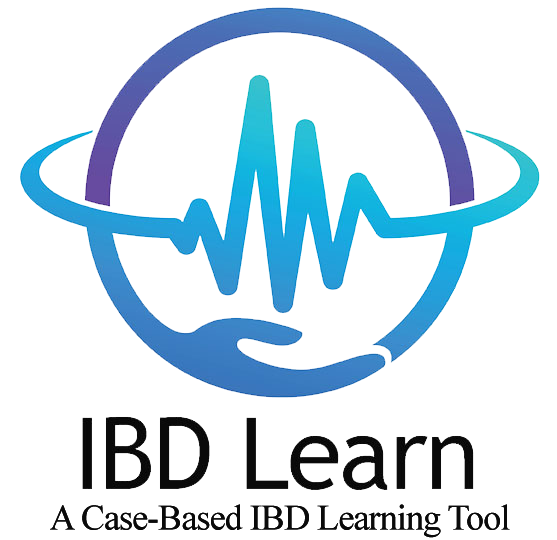Case 20 Discussion
Learning Objectives:
- Identify medications utilized for management of Crohn’s disease and their mechanisms of action.
- Recognize medications that may be effective in those with prior TNF failure.
- Understand the indications and scenarios in which dual biologic/ small molecule therapy may be considered.
- Identify possible dual biologic/ small molecule combinations.
IBD EPAs
- EPA 1: Classify IBD phenotype, disease activity, and extraintestinal manifestations
- EPA 3: Prescribe and manage evidenced-based IBD therapies using clinical pharmacologic principles in clinical practice
- EPA 4: Manage adverse events and complications of IBD and IBD therapies
- EPA 7: Manage IBD in special populations
When a patient fails all approved therapies for IBD, dual biologic or small molecule combination therapy can be considered. A specific meta-analysis looked at 30 studies reporting 288 trials of dual biologic or small molecule therapy in 279 patients.3 76% had Crohn’s disease, and the median duration of treatment was 24 weeks. The main indications for dual therapy were medically refractory IBD in 81% of patients and concurrent extra-intestinal manifestations or rheumatologic disease in 12% of patients. The most commonly used combination was anti-TNF and anti-integrin therapy (48%) with the second most common being ustekinumab and anti-integrin (12%). 61% of patients had failed at least one of the two therapies used in combination. Pooled rates of clinical remission in all those receiving dual therapy was 58% and pooled endoscopic remission was 34%. Combination tofacitinib and anti-TNF comprised of only 3% of cases. When considering dual biologic/ small molecule treatment, combining with a JAK inhibitor and TNF antagonist carries much higher risk, and is not commonly done. Given it’s limited use, it is difficult to draw conclusions at this time about its efficacy or safety. However, given their individual risk factors, combination with these two agents is not recommended.
The thought behind using dual biologic/ small molecule therapy is that targeting different inflammatory pathways may result in greater disease control. In this study, with a highly refractory population, the pooled rate of clinical remission was 59%, and the pooled rate of endoscopic remission was 34% (3).
From a safety standpoint and given the favorable safety profile of ustekinumab and vedolizumab, it is acceptable to use these treatments in combination with other biologics or small molecules. Using vedolizumab in combination with ustekinumab targets different pathways and can be an effective option. Moreover, using vedolizumab or ustekinumab in combination with a JAK inhibitor or anti-TNF can be an effective option as well. As previously mentioned, there is limited data on the combination of a JAK inhibitor and anti-TNF and thus this is rarely used. Moreover, given their individual risk profiles of increased MACE events, malignancy, and infectious events, the cumulative potential adverse events may outweigh any efficacy benefit from this combination.
Risankizumab was recently FDA approved for Crohn’s disease. While this will not help her rheumatoid arthritis, it is another option for Crohn’s disease. Finally, a phase 3 study of upadacitinib for Crohn’s disease was presented at Digestive Diseases Week 2022 (5). While use is off-label for Crohn’s disease, this agent can help both her Crohn’s disease and her rheumatoid arthiritis.
- Singh S, Fumery M, Sandborn WJ, et al. Systematic review and network meta-analysis: first- and second-line biologic therapies for moderate-severe Crohn’s disease. Aliment Pharmacol Ther 2018;48:394-409.
- Ytterberg SR, Bhatt DL, Mikuls TR, et al. Cardiovascular and Cancer Risk with Tofacitinib in Rheumatoid Arthritis. N Engl J Med 2022;386:316-326.
- Ahmed W, Galati J, Kumar A, et al. Dual Biologic or Small Molecule Therapy for Treatment of Inflammatory Bowel Disease: A Systematic Review and Meta-analysis. Clin Gastroenterol Hepatol 2022;20:e361-e379.
- Alayo QA, Fenster M, Altayar O, Glassner KL, Llano E, Clark-Snustad K, Patel A, Kwapisz L, Yarur AJ, Cohen BL, Ciorba MA, Thomas D, Lee SD, Loftus EV Jr, Fudman DI, Abraham BP, Colombel JF, Deepak P. Systematic Review With Meta-analysis: Safety and Effectiveness of Combining Biologics and Small Molecules in Inflammatory Bowel Disease. Crohns Colitis 360. 2022 Feb 10;4(1):otac002. doi: 10.1093/crocol/otac002. PMID: 35310082; PMCID: PMC8924906.
- Colombel, Jean-Frederic, et al. “867F: Efficacy and Safety of Upadacitinib Induction Therapy in Patients with Moderately to Severely Active Crohn’s Disease Who Failed Prior Biologics: Results from a Randomized Phase 3 U-EXCEED Study.” Gastroenterology, vol. 162, no. 7, 2022, https://doi.org/10.1016/s0016-5085(22)64061-7.
